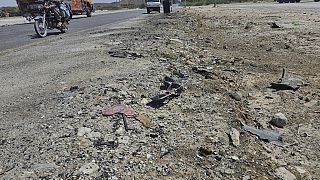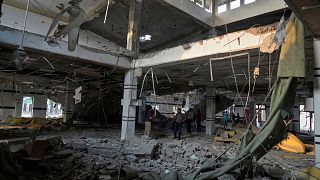Pakistan
Karachi, Pakistan's largest city with nearly 15 million inhabitants, is currently enduring an extreme heatwave, compelling charities to set up roadside stands offering cold water to help people cope with the soaring temperatures. The city's densely packed streets, dominated by concrete structures, have exacerbated the effects of the heat.
Hospitals in Karachi are overwhelmed with heat stroke patients. Dr. Nizamuddin Sheikh, the additional medical superintendent at Civil Hospital, Karachi, reports that around 300 patients suffering from symptoms like diarrhea, vomiting, and fever due to extreme heat have been treated. He emphasizes the importance of staying hydrated and indoors to avoid heat-related illnesses.
Meteorologist Dr. Sardar Sarfaraz warns that the heatwave could persist for up to 12 days, with additional temperature spikes expected before the monsoon rains provide relief in late June. Authorities have advised residents to stay indoors, stay hydrated, and avoid unnecessary travel. However, laborers working in construction sites have little choice but to continue their work in the scorching sun to support their families.
Environmental experts point to the city's rapid urbanization and lack of greenery as significant contributors to the rising temperatures. Dr. Amir Alamgir, an assistant professor at the Institute of Environmental Studies at the University of Karachi, explains, "Basically, we have turned Karachi into a concrete jungle. There are many projects and housing schemes due to which the temperature of Karachi has increased." He notes that the green cover in Karachi is a mere five percent, insufficient to mitigate the heat.
The current heatwave is the latest in a series of climate-related disasters affecting Pakistan. Previous events include melting glaciers and severe monsoon rains that have caused devastating floods, submerging large portions of the country. Dr. Alamgir stresses the need for an environment-friendly lifestyle and increased environmental awareness, urging collaboration between the government and private sectors.
Local residents like Majid Ali criticize the government's response to the extreme conditions. "People on their own have arranged cold drinking water for others on roads. But it should be done by the government, particularly for women, for those waiting on roads for buses," he says, highlighting the community's efforts to support one another in the absence of sufficient government action.
This year, Pakistan experienced its wettest April since 1961, with rainfall more than double the usual amount for the month. The heavy rains in April led to numerous casualties and extensive property and farmland damage. The ongoing heatwave raises concerns about further flooding in the northwest due to accelerated glacial melting, as daytime temperatures soar 8 degrees Celsius (46 degrees Fahrenheit) above the average for May.












01:29
Experts warn of danger of exercising in extreme heat and humidity
01:46
Algerian football players deal with intense heat as season ends
00:24
Greenland and Iceland saw record heat in May
01:30
Macron sparks global push to protect oceans
01:06
Experts warn of an increase in Glacier-related risks from climate change
01:39
Hundreds dead and missing after Nigerian town submerged by floods